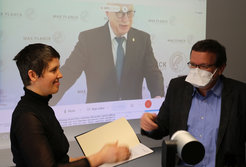Communitas Prize for Viola Priesemann
The Max Planck Society honors the physicist for her science communication during the Corona pandemic
Her expertise is in demand. She advises politicians such as Angela Merkel, gives interviews, writes statements and publishes her scientific work in prestigious journals. For many it is a mystery where Viola Priesemann gets her energy from. Since the beginning of the pandemic, she has been calculating scenarios of how the spread of the Sars-CoV2 coronavirus increases or decreases under different conditions. Not least she has taken up the topic because she can rely on similar mathematical theories for the projects as she does for her actual research topic on the spread of information in the brain.

Max Planck President Martin Stratmann (on the screen) awarded Viola Priesemann the MPG's Communitas Prize during the meeting of the Scientific Council. Eberhard Bodenschatz presented the certificate on his behalf.
Viola Priesemann dedicated herself to the analysis of neuronal processes with physical-mathematical methods already in her diploma thesis at the Max Planck Institute for Brain Research, where she also did her PhD after her studies at the TU Darmstadt. She moved to the Max Planck Institute for Dynamics and Self-Organization after completing her PhD in 2013. In 2014, she became a Bernstein Fellow and shortly thereafter Max Planck Research Group Leader for the Theory of Neural Networks.
From information propagation in the brain to corona modeling
In April, Viola Priesemann succeeded in quantifying the effect of the first lockdown and published this in the journal "Science". She then turned her attention to the effect of containment strategies and found that, in addition to an R-value above 1, there can be another tipping points in the infection pattern when infection numbers rise to the point that public health departments can no longer thoroughly identify, test and, if necessary, isolate the contacts of infected persons. From this, she derives a containment strategy that has found its way into several position statements. Since the virus does not stop at borders, she recently initiated two interdisciplinary statements to achieve joint European action on containment - supported by more than a thousand scientists.
Indeed, the advice of scientists has rarely been more in demand than during the Corona pandemic. Science communication is also finding more space than usual in the daily press - and yet: science is in a real dilemma. "We are used to taking our time in the search for explanations, and yet we are forced to give advice and recommendations under extreme time pressure, to reduce our knowledge to core statements, in interviews, talk shows or news broadcasts," said Max Planck President Martin Stratmann during the award ceremony.
Admirable confidence, perseverance and straightforwardness
Since people are asking for answers, researchers could not hide in the ivory tower, but had to face the needs and fears of citizens. "Viola Priesemann has taken on this challenge with admirable confidence, perseverance and straightforwardness," Stratmann said. "She kept at it and still managed to keep the balance on the fine line between objectivity and personal expression of opinion. I think that's admirable." Despite the complexity of the subject matter, she continued her work, refining her models and keeping the public informed, he said.
"We at the Max Planck Institute for Dynamics and Self-Organization are all very proud of the role Viola Priesemann has played as a public voice of reason at a time when there was so much uncertainty," said Ramin Golestanian, the institute's executive director. "Viola is highly deserving of this award - always clear and in the service of communicating science for the good of all.", adds Eberhard Bodenschatz. "I admire the straightforward level-headedness with which she navigates the lion's den of Corona discussions seemingly effortlessly and always with negotiating skills - always in the service of scientific clarity. Chapeau!", Stephan Herminghaus concludes the laudation of the directors of the MPIDS.
With the Max Planck Communitas Award, the President has honored exceptional commitment to the interests of the Max Planck Society since 2014. Scientific and non-scientific members are honored. Before Viola Priesemann, the following scientists already received this award: Ulrich Sieber and Rüdiger Wolfrum (2018), Reinhard Jahn (2016), Wolf Singer (2015), and Jürgen Renn, Robert Schlögl and Bernard Schutz (2014). Among the non-scientific members, Georg Heyne and Heinz Junkes (2019), Verena Mauch and Christane Walch-Solimena (2017), and Georg Botz (2014) were honored.
